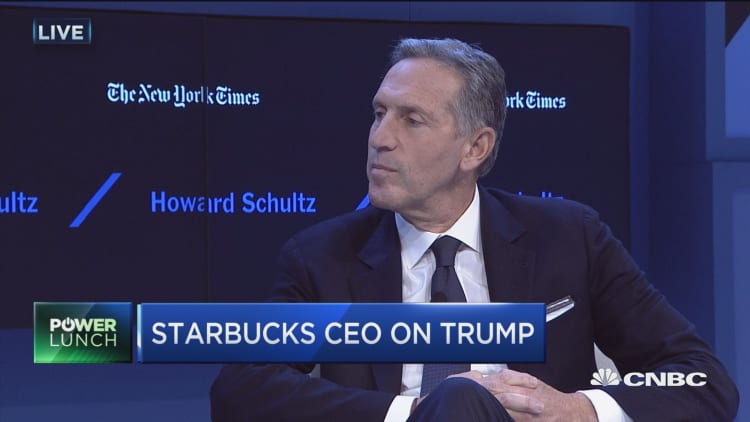
Howard Schultz, chairman and CEO of Starbucks, said that both the nation and the world at large are in a "state of shock and disbelief" over the results of the election.
"I think we are looking at years and years of a great many people in Amercia feeling like they haven't been heard and listened to and had been let down, he said.
Schultz spoke from the DealBook Conference in New York, hosted by CNBC anchor and New York Times columnist Andrew Ross Sorkin and the editors of the Times. The conference focuses on "playing for the long term" in a business environment that's shackled to quarterly returns and compressed news cycles.
Schultz also laughed off a claim by Donald Trump that Trump Tower had the most successful Starbucks store. "Every once in awhile you wake up and say, 'what?'" he said.
Even though Trump criticized Starbucks' red cups last winter, the coffee chain had its best Christmas season ever. Schultz endorsed Trump's opponent, Hillary Clinton, earlier this year.
"Washington has been broken for quite some time," Schultz said. "The rules of engagement for a public company today are very different as a result of Washington not doing its job."
Last month, Starbucks announced plans to nearly double its China locations to 5,000 by 2021, after growing locations in the Asian nation from 400 stores in 2011 to more than 2,300 locations today.
Starbucks has a unique role as an American company operating abroad, Schultz said, as it adapts to customs that might be considered un-American. He said there was a lot more admiration of America 20 years ago than he sees today.
"Unfortunately there's been a lack of truth and authenticity in America for a while," Schultz said. "When you carry the American flag from the U.S. to another country, there is both a feeling of pride because of the American story and the American process, and then I think there is a new level of skepticism because of things that have happened over several years."
Starbucks has operated in China for nearly two decades, amid drastic changes in the region. China is mounting an uneasy transition to a consumer-centric business environment after years as a manufacturing-based economy fueled by state-owned enterprises.
"There will be cyclical changes as a result of the economic transformation under President Xi," Schultz said. "There will be times…that will result in the media [overestimating] changes."
Schultz's bullishness on China comes amid an uncertain future for trade there. President-elect Donald Trump has campaigned to raise tariffs on trade with China.
"In the political season that we just went through with just a vitriolic display of hatred… while people were saying it, they knew it wasn't true," Schultz said.
Schultz said he doesn't expect that investments in technology and the mobile ecosystem will lead to fewer employees at Starbucks. But he did say that e-commerce will lead to a significant number of store closures in the future, because America is "over-retailed."
"We are certainly in an evolutionary period," Schultz said. "I don't have the answers as to where those jobs are going to go. The brick and mortar stores that exist today, there's going to be a lot less of them in the future."
Schultz said that Starbucks is committed to adhering to values, such as paying above minimum wage, that have helped the company be successful over the past two decades. But sometimes long-term goals of the company are not consistent with what's expected on Wall Street, he said, giving activist investors as one example.
"What was the catalyst for activism?" Schultz said. "The catalyst is that there are bad actors. But not all companies are evil. And not all management teams are bad. When a company is doing the right thing and taking the long view and doing everything it can to share success with their employees and shareholders, there should be no room for the kind of activism we've seen over the years."
Schultz talked about his view of the American dream and capitalism, as someone who grew up on "the wrong side of the tracks" in Brooklyn's projects. He said Washington needs to understand that not all business is evil.
"We are creating the jobs in America and capitalism is an unbelievable source of revenue and opportunities across the country, and most business are good," Schultz said.
— CNBC's Christing Wang contributed to this report.


